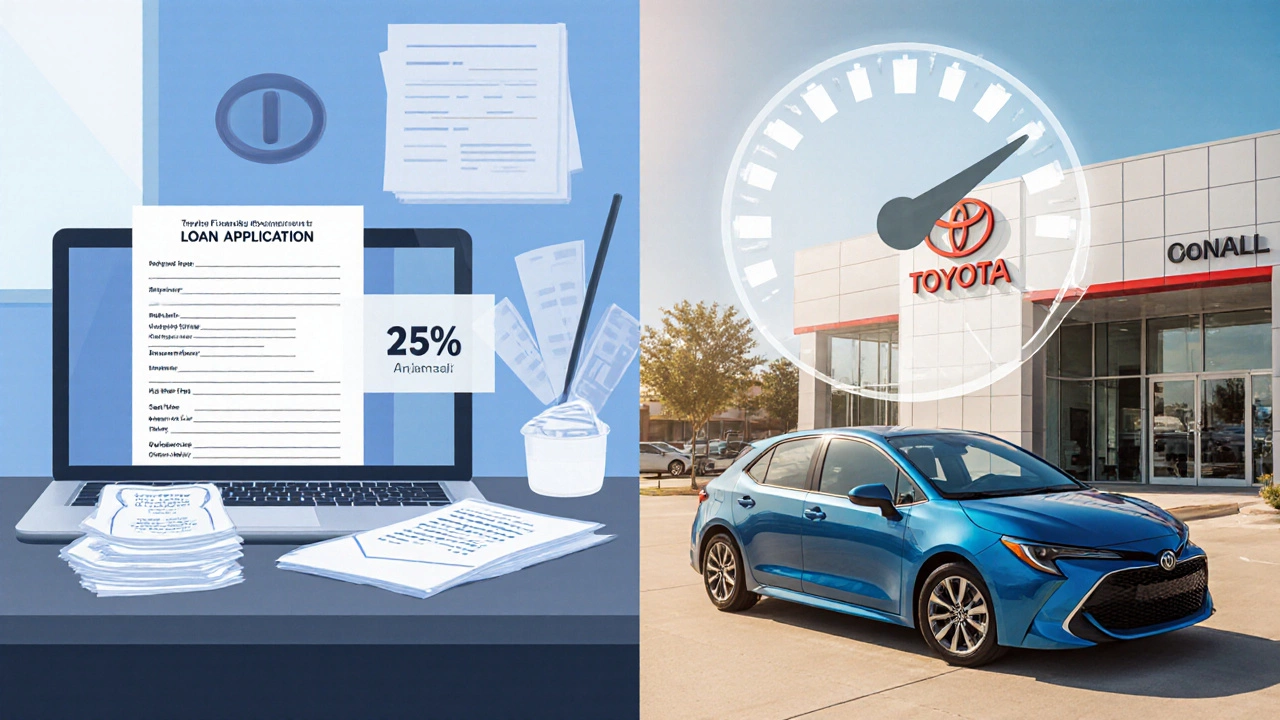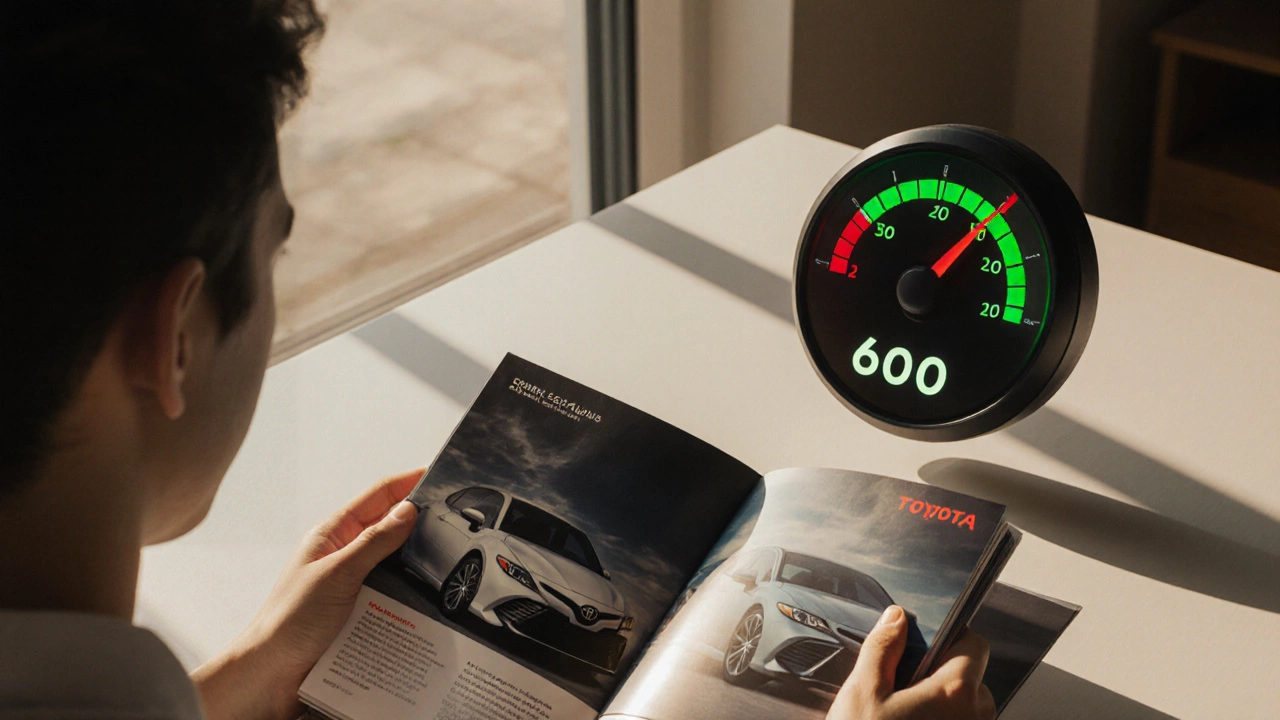Toyota Finance Eligibility Calculator
Calculate Your Toyota Financing Eligibility
Enter your details to see if you qualify for Toyota financing based on current standards.
Eligibility Assessment
Not EligibleCredit score is below Toyota's minimum requirement.
Estimated Monthly Payment
$0
Per month
When you’re eyeing a new Toyota, the first thing that pops up after the price tag is the credit score question: "What’s the lowest credit score Toyota will finance?" In Australia the answer isn’t a one‑size‑fits‑all number, but you can narrow it down by understanding how Toyota Financial Services (TFS) looks at your credit profile, what other pieces of the puzzle matter, and which tricks can push a marginal score over the line.
Key Takeaways
- Toyota Financial Services generally starts approving loans at a credit score of around 600 (Equifax scale).
- Higher scores (650+) get better interest rates and larger loan‑to‑value (LTV) options.
- Income, employment stability, and a sizeable deposit can offset a lower score.
- If you’re below 600, consider a co‑signer, a secured loan, or a dealer‑arranged finance plan.
- Preparing documents and checking your credit report beforehand speeds up approval.
Understanding Credit Scores in Australia
In the Australian market a Credit score is a three‑digit number that predicts how likely you are to repay a loan on time. The major credit reporting agencies-Equifax, Experian and illion-use slightly different scales, but they all map roughly to low (below 500), fair (500‑600), good (600‑700) and excellent (700+). Lenders pull this number during a credit inquiry and weigh it against other risk factors.
Because each bureau has its own algorithm, you might see a 620 on your Equifax report and a 580 on illion. For consistency, most Australian car financiers quote a single benchmark, usually the Equifax scale, when they talk about “minimum credit scores”.
How Toyota Financial Services Evaluates Credit
Toyota Financial Services (TFS) is the captive finance arm of Toyota Australia. It follows a structured underwriting model that looks at three core areas:
- Credit score - the primary risk indicator.
- Financial capacity - income, existing debt, and cash flow.
- Loan parameters - vehicle price, deposit size, and desired loan‑to‑value ratio.
TFS does not publish a hard minimum score, but data from recent approvals (2023‑2025) shows the following practical thresholds:
- Score < 550 - typically declined unless backed by a strong co‑signer.
- Score 550‑599 - may be approved for high‑deposit contracts (20%+).
- Score 600‑649 - standard approval range for most new and used Toyotas.
- Score 650+ - eligible for the lowest APR tiers and higher LTV limits (up to 100%).
These ranges line up with TFS’s internal risk bands, which dictate the interest rate you’ll be offered.
Lowest Credit Score Toyota Typically Accepts
While the exact cutoff can shift with market conditions, the consensus among finance officers in Sydney dealerships is that a score of about 600 on the Equifax scale is the lowest number you can expect to be regularly approved for without extra guarantees. Below that, approval chances drop sharply, but they’re not zero.
| Lender | Minimum Score for Approval | Typical APR (2025) |
|---|---|---|
| Toyota Financial Services | ≈600 | 4.9% - 6.5% |
| Commonwealth Bank Car Loan | ≈580 | 5.2% - 7.0% |
| MotorVantage (Online Lender) | ≈620 | 4.7% - 6.2% |
| Local Credit Union | ≈560 | 5.0% - 6.8% |
Notice how TFS offers a slightly lower APR for borrowers in the 600‑649 band compared to generic bank loans, thanks to its deep relationship with Toyota dealerships.

Factors Beyond the Score
Even if you sit right at the 600 mark, TFS looks at the whole financial picture. Here’s what can tip the scales in your favor:
- Deposit size - A 20% or larger down‑payment reduces the lender’s exposure, often allowing approval for scores as low as 580.
- Employment stability - A continuous 12‑month employment record with the same employer is a strong signal.
- Debt‑to‑income (DTI) ratio - Keeping DTI below 35% keeps you in the “low risk” bucket.
- Vehicle choice - Newer models with higher residual values are easier to finance than older, high‑ mileage cars.
- Loan‑to‑value (LTV) ratio - Staying under 80% LTV (loan amount ÷ vehicle price) improves acceptance odds.
Tips to Secure Toyota Finance with a Low Score
- Check your credit report now. Request free copies from Equifax, Experian and illion, then dispute any inaccuracies.
- Pay down existing revolving debt (credit cards, personal loans) to bring your DTI down.
- Save a larger deposit. If you can put 25% or more down, TFS often relaxes the score requirement.
- Consider a co‑signer with a stronger credit history. The co‑signer’s score is factored into the decision.
- Apply for a pre‑approval online. Pre‑approval gives you a clear sense of the score they’ll accept before you step onto the showroom floor.
- Choose a model with a high residual value (e.g., Corolla, RAV4). Higher residuals lower the lender’s risk.
- Provide proof of stable income - recent payslips, tax returns, and a letter from your employer.
Alternative Financing Options if You’re Below the Threshold
If your score sits under 580, don’t panic. Several routes can still get you behind the wheel of a Toyota:
- Dealer‑arranged “bad credit” finance - Some Toyota dealerships partner with third‑party lenders that specialize in sub‑prime borrowers. Rates are higher, but approvals are more flexible.
- Secured personal loan - Use a savings account or other asset as collateral. This can lower the effective interest rate and bypass the low credit score barrier.
- Hire purchase agreement - You own the car once the final payment is made, but the lender holds the title until then. These agreements often have looser credit criteria.
- Family or friend co‑ownership - Adding a trusted family member as a joint borrower can improve the application’s risk profile.
Whichever path you choose, always calculate the total cost of borrowing (including any fees or ball‑track charges) to avoid surprise expenses down the road.

Application Process - What to Expect
- Pre‑approval: Fill out an online form on the TFS website. You’ll need your driver's licence, proof of residence, and consent to a credit check.
- Document upload: Provide recent payslips, bank statements (last two months), and proof of deposit.
- Vehicle selection: Choose the Toyota model, colour, and any optional accessories. The dealer will feed this data back to TFS.
- Risk assessment: TFS runs the credit check, evaluates DTI and LTV, then generates a rate quote.
- Offer review: You’ll receive a loan offer outlining the APR, term (usually 24‑72 months), and monthly repayment.
- Signing: Sign the contract either digitally or in‑person at the dealership. The loan is disbursed to the dealer, and you drive off.
The whole cycle can take as little as 24 hours for a well‑prepared applicant, but if any documents are missing, expect a few extra days.
Common Pitfalls and How to Avoid Them
- Skipping the credit check - Not knowing your score can lead to surprise rejections. Always pull your report first.
- Over‑stretching the budget - A low score often means higher interest. Use a loan calculator to ensure the monthly payment fits your cash flow.
- Ignoring extra fees - Administration fees, early repayment penalties, and optional insurance can add several hundred dollars to the total cost.
- Choosing a high‑LTV loan - Financing 100% of the vehicle price leaves you with little equity if the car depreciates quickly.
- Not negotiating the rate - Even with a borderline score, you can ask for a rate reduction if you have a large deposit or a co‑signer.
Frequently Asked Questions
What credit score does Toyota Financial Services require for a used car?
For used Toyota models, TFS usually starts approving loans at a score of about 600 on the Equifax scale. That threshold can drop to 580 if you put down at least 20% of the purchase price.
Can I get a Toyota loan with a 550 credit score?
A 550 score is on the fringe. Approval is possible if you have a strong deposit, a co‑signer, or low existing debt. Expect a higher APR and possibly a shorter loan term.
How long does the Toyota financing approval take?
If all documents are in order, TFS can give a decision within 24 hours of submitting the application. Delays usually stem from missing paperwork or the need for a co‑signer’s details.
Is a larger deposit more important than a higher credit score?
Both matter, but a larger deposit can compensate for a lower score. A 25% down‑payment often lets borrowers with scores in the high‑500s secure approval at a reasonable rate.
What are the alternatives if Toyota Finance turns me down?
You can explore dealer‑arranged sub‑prime lenders, secured personal loans, hire‑purchase agreements, or get a family member to co‑sign. Each option has its own cost structure, so compare total repayments carefully.

